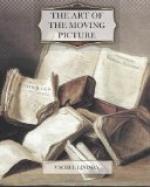Blanche Sweet as Judith is indeed dignified and ensnaring, the more so because in her abandoned quarter of an hour the Jewish sanctity does not leave her. And her aged woman attendant, coming in and out, sentinel and conscience, with austere face and lifted finger, symbolizes the fire of Israel that shall yet awaken within her. When her love for her city and God finally becomes paramount, she shakes off the spell of the divine honors which she has followed all the camp in according to that living heathen deity Holofernes, and by the very transfiguration of her figure and countenance we know that the deliverance of Israel is at hand. She beheads the dark Assyrian. Soon she is back in the city, by way of the little gate by which she emerged. The elders receive her and her bloody trophy.
The people who have been dying of thirst arise in a final whirlwind of courage. Bereft of their military genius, the Assyrians flee from the burning camp. Naomi is delivered by her lover Nathan. This act is taken by the audience as a type of the setting free of all the captives. Then we have the final return of the citizens to their town. As for Judith, hers is no crass triumph. She is shown in her gray and silvery room in her former widow’s dress, but not the same woman. There is thwarted love in her face. The sword of sorrow is there. But there is also the prayer of thanksgiving. She goes forth. She is hailed as her city’s deliverer. She stands among the nobles like a holy candle.
Providing the picture may be preserved in its original delicacy, it has every chance to retain a place in the affections of the wise, if a humble pioneer of criticism may speak his honest mind.
Though in this story the archaic flavor is well-preserved, the way the producer has pictured the population at peace, in battle, in despair, in victory gives me hope that he or men like unto him will illustrate the American patriotic crowd-prophecies. We must have Whitmanesque scenarios, based on moods akin to that of the poem By Blue Ontario’s Shore. The possibility of showing the entire American population its own face in the Mirror Screen has at last come. Whitman brought the idea of democracy to our sophisticated literati, but did not persuade the democracy itself to read his democratic poems. Sooner or later the kinetoscope will do what he could not, bring the nobler side of the equality idea to the people who are so crassly equal.
The photoplay penetrates in our land to the haunts of the wildest or the dullest. The isolated prospector rides twenty miles to see the same film that is displayed on Broadway. There is not a civilized or half-civilized land but may read the Whitmanesque message in time, if once it is put on the films with power. Photoplay theatres are set up in ports where sailors revel, in heathen towns where gentlemen adventurers are willing to make one last throw with fate.




